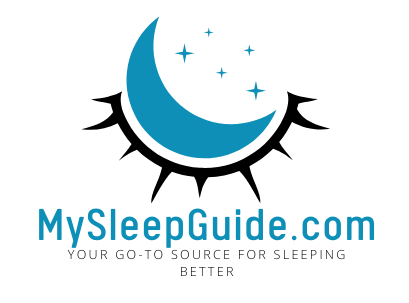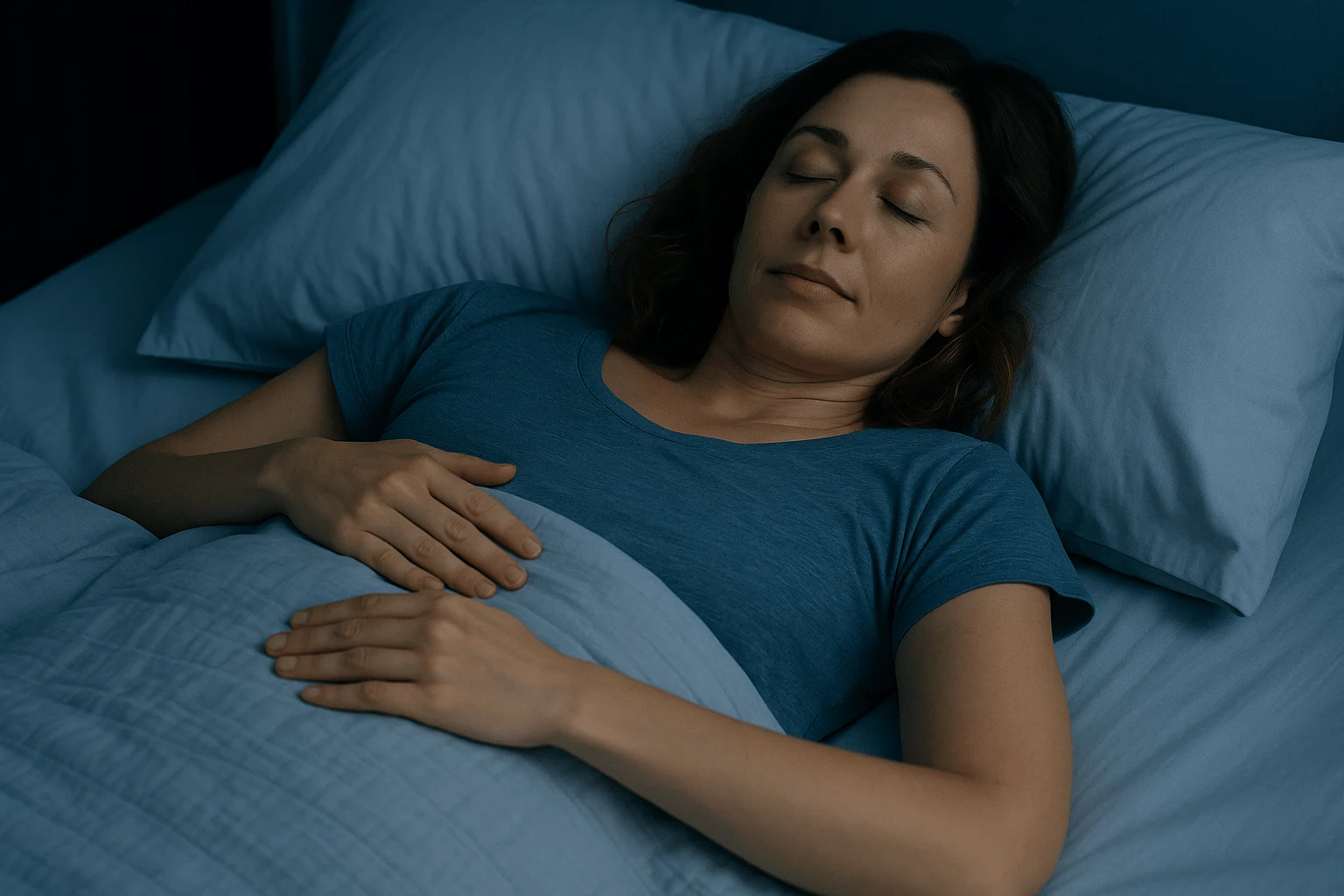Ever notice how some people wake up refreshed while others hit snooze again and again? The difference isn’t luck — it’s habits. The truth is, the way you move, eat, and unwind during the day shapes how well you sleep at night.
Healthy sleep isn’t built in a single night. It’s created through small, consistent choices that train your body’s internal clock — your circadian rhythm — to know exactly when it’s time to rest.
If you’ve been feeling wired at bedtime or sluggish in the morning, you’re not alone. The good news is that the fix isn’t complicated. By following a few proven healthy sleep habits, you can help your body find its natural rhythm again — and wake up feeling clear, calm, and ready for the day.
Why Healthy Sleep Habits Matter
When people think about improving their sleep, they often focus on what happens right before bed. But the truth is, healthy sleep habits are built over 24 hours — not just at night.
Your body runs on a biological clock called the circadian rhythm. It uses light, temperature, and timing cues from your environment to decide when to release energy-boosting hormones like cortisol and sleep-promoting ones like melatonin. When these cues are in sync, you fall asleep easily and wake up refreshed. When they’re off — say, from late-night scrolling or irregular bedtimes — your body feels confused, leading to restless nights and groggy mornings.
The Health Impact of Poor Sleep Habits
Disrupted sleep doesn’t just make you tired. Over time, it affects every system in your body — from your mood to your metabolism. Studies from Harvard Health show that irregular sleep patterns can increase stress, raise blood pressure, and weaken your immune system. On the flip side, consistent healthy sleep habits strengthen memory, support emotional balance, and improve energy throughout the day.
How Better Habits Reset Your System
The most effective changes are often the simplest: going to bed and waking up at the same time, stepping outside for morning sunlight, and winding down with a calm bedtime routine. These cues help your circadian rhythm stay aligned — signaling your brain when it’s time to power down and when it’s time to rise.
If you start noticing you fall asleep faster and wake up without an alarm, that’s your body’s way of saying, “Thanks for the consistency.”
The 10 Best Healthy Sleep Habits for Better Rest
Before you dive into these habits, here’s something to remember: sleep isn’t just something that happens — it’s something your body learns through rhythm and repetition.
The following 10 healthy sleep habits are simple, realistic ways to retrain your body to rest more deeply and wake more easily.
1. Keep a Consistent Sleep and Wake Schedule
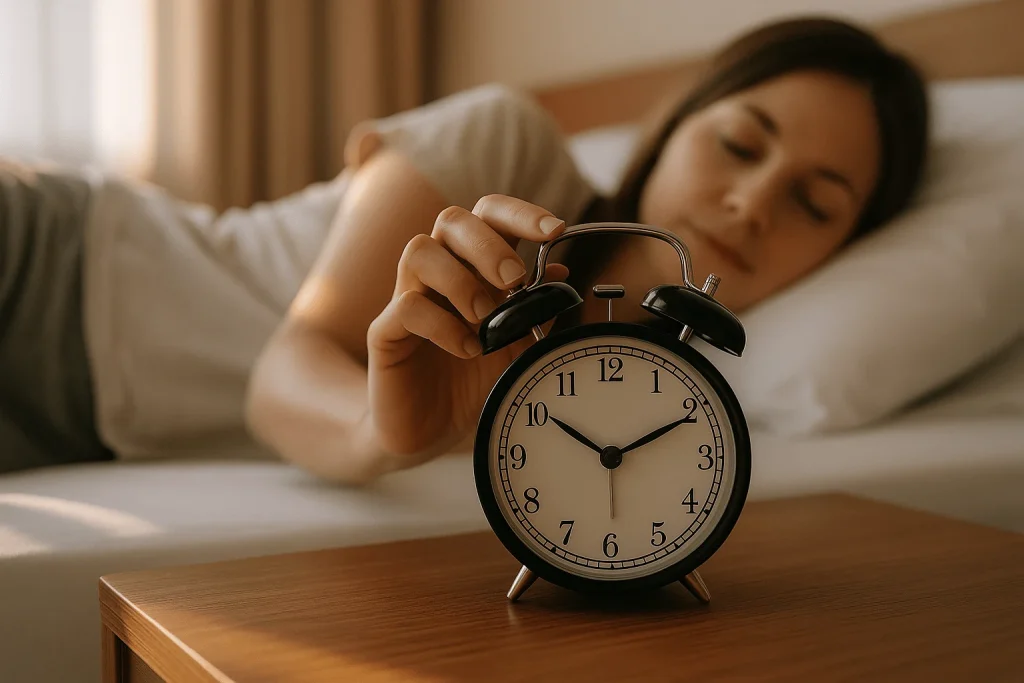
Your body thrives on predictability. Going to bed and waking up at the same time each day trains your internal clock — your circadian rhythm — to expect sleep at the right time.
Even a one-hour difference on weekends can throw things off, creating “social jet lag.”
Try keeping your wake time steady within 30 minutes, even on days off. Your sleep will become more automatic and refreshing.
2. Get Morning Sunlight Exposure

Light is your body’s strongest sleep signal. Getting 10–15 minutes of morning sunlight soon after waking helps your brain release serotonin — the daytime chemical that later turns into melatonin, your sleep hormone.
If you can’t get outside, open your curtains or work by a bright window. It’s a simple way to anchor your rhythm for better sleep at night.
3. Move Your Body During the Day

Exercise is one of the best ways to improve sleep depth and reduce stress. It raises your core temperature and helps your body cool down later, triggering natural drowsiness.
Aim for at least 30 minutes of movement most days — a brisk walk, yoga, or light strength training.
If you prefer intense workouts, finish them 2–3 hours before bed to avoid overstimulation.
4. Limit Caffeine and Nicotine

Caffeine has a half-life of about six hours, which means that afternoon latte can still be active at bedtime.
Set a caffeine curfew around 2 p.m., and watch how much better you fall asleep.
Nicotine, another stimulant, can also delay sleep and cause light, fragmented rest — especially if used close to bedtime.
Try switching to herbal tea or decaf options later in the day.
5. Create a Calming Bedtime Routine

Think of your bedtime routine as your body’s nightly cue to slow down.
Do the same few things in the same order each night — maybe stretch, read, or write a few lines in a journal.
Over time, this pattern tells your brain, “It’s time to power down.”
Avoid stimulating tasks like checking email or scrolling social media — they do the opposite.
6. Power Down Screens Before Bed
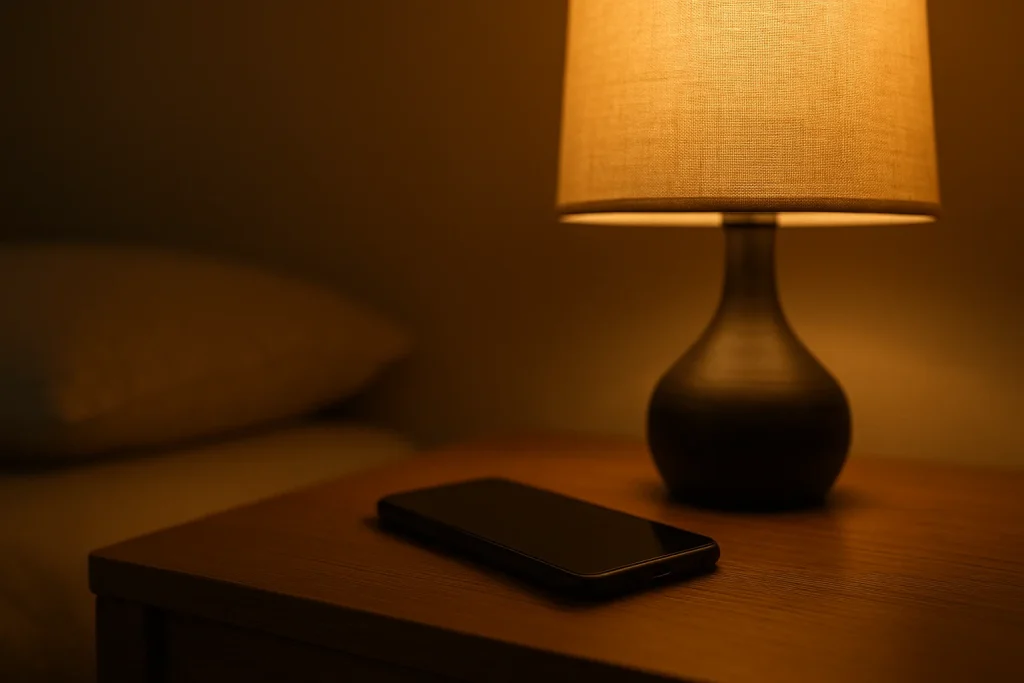
The blue light from phones, TVs, and tablets suppresses melatonin and keeps your mind alert.
Try dimming devices an hour before bed, switching to “Night Shift” or “Warm Light” mode, or replacing screens with an audiobook or light music.
Your eyes — and your brain — will thank you.
7. Keep Your Bedroom Cool, Dark, and Quiet
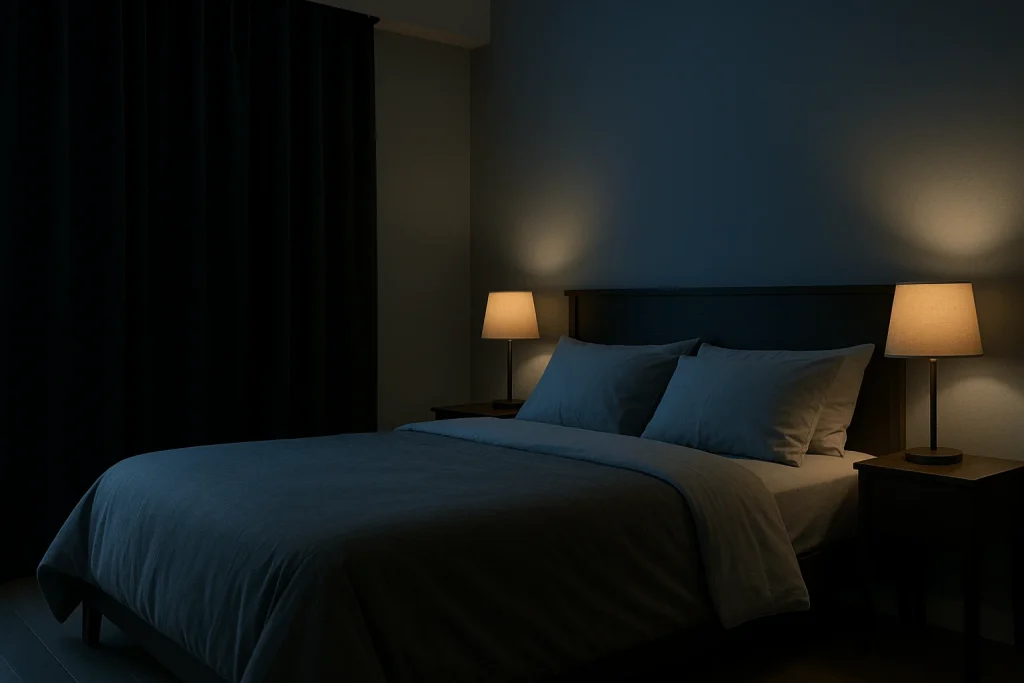
Your sleep environment plays a huge role in how well you rest.
-Aim for a room temperature between 17–20°C (63–68°F).
-Use blackout curtains or a sleep mask to block light, and add white noise or a fan if outside sounds bother you.
A comfortable, uncluttered bedroom sends a clear message: this space is for sleep.
8. Eat Light and Early

Late-night meals can disrupt your body’s temperature regulation and digestion — two things that affect sleep quality.
-Try to finish dinner 2–3 hours before bedtime.
-If you get hungry later, choose light, sleep-friendly snacks like yogurt, oatmeal, or a banana.
-Avoid using alcohol as a “nightcap”; it may help you fall asleep faster, but it leads to poor-quality, fragmented sleep later in the night.
9. Take Short, Early Naps (If You Need Them)
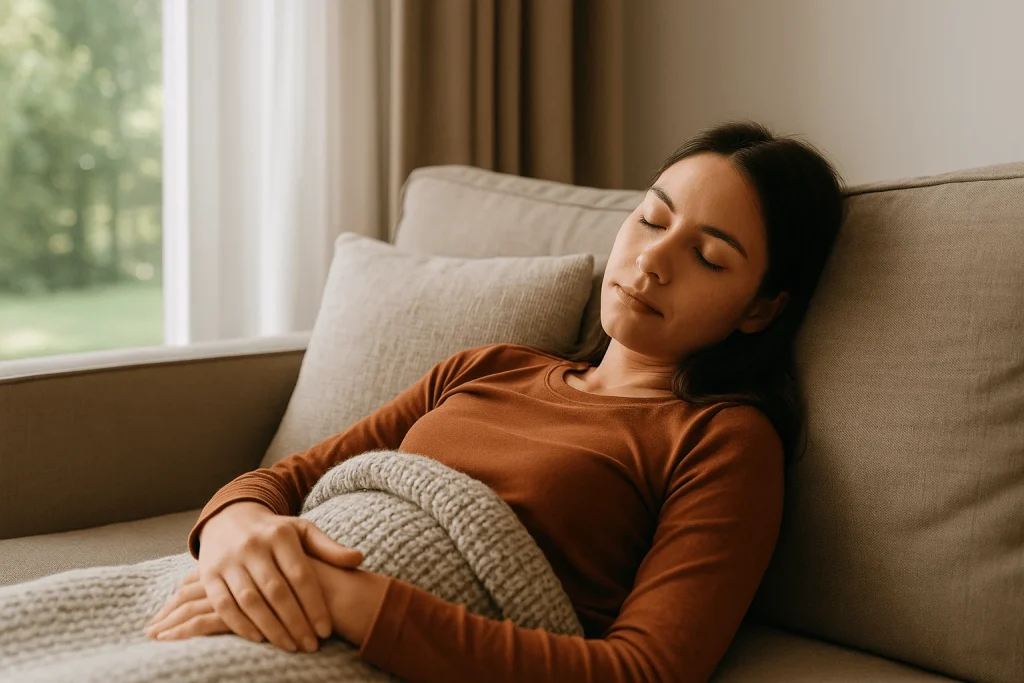
A quick nap can recharge your energy and improve focus — just keep it short and early in the day. Aim for about 20 minutes before mid-afternoon so it doesn’t interfere with nighttime sleep. Use naps as a light reset, not a substitute for the full rest your body gets overnight.
10. Manage Stress and Calm a Busy Mind
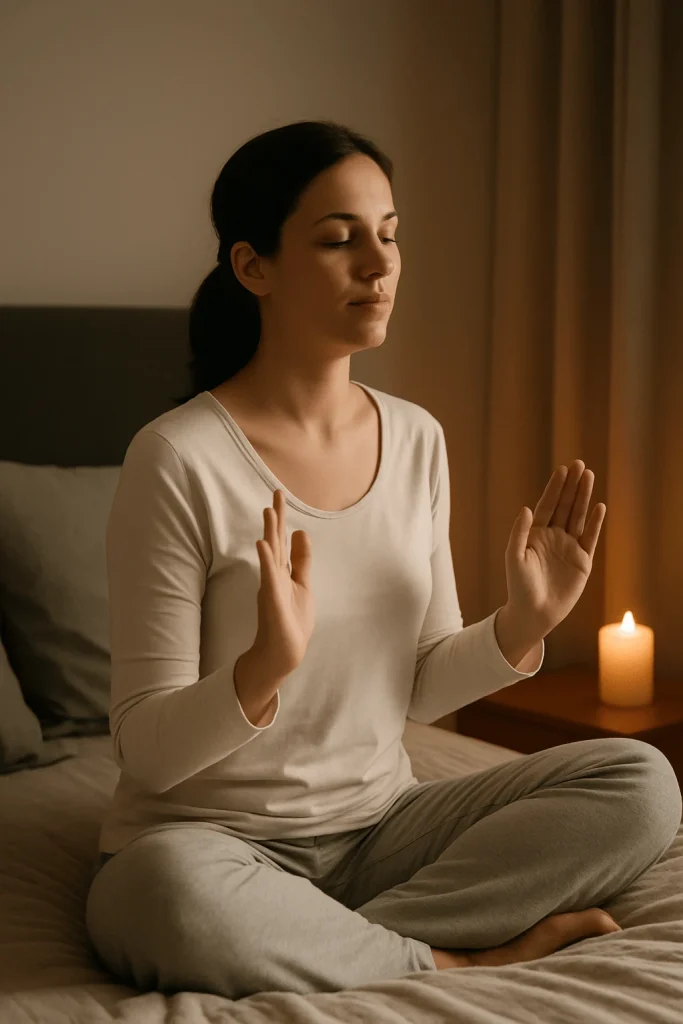
It’s hard to sleep when your thoughts won’t stop racing. Stress hormones like cortisol can block melatonin and delay sleep onset.
Try a few minutes of breathing exercises or sleep journaling before bed. You don’t need to silence every thought — just lower the volume enough for your body to relax and drift toward rest.
How Do I Fix My Circadian Rhythm?
Even when you follow all the right healthy sleep habits, your body can still feel “off.” That usually means your circadian rhythm — the 24-hour internal clock that tells your body when to feel awake or sleepy — is misaligned.
Your circadian rhythm relies on timing and light cues. When those signals get mixed up — from staying up late, sleeping in, or using bright screens at night — your body’s natural rhythm drifts out of sync. You might notice you’re tired during the day but alert at bedtime, or that waking up feels like a struggle no matter how long you sleep.
The fix starts with consistency. Regular wake times, morning sunlight, and calmer evenings help your body relearn its rhythm. Over time, these cues train your brain to release the right hormones at the right times — melatonin at night, cortisol in the morning — so sleep starts to feel effortless again.
If your sleep cycle has been irregular for months or disrupted by shift work or travel, it may take a few weeks to reset. Stay steady, and your natural rhythm will follow.
Long-Term Sleep Health and Lifestyle Support
Once your circadian rhythm feels balanced again, the next step is maintaining it.
Good sleep isn’t just a short-term fix — it’s a lifelong skill. And like any healthy habit, it strengthens with consistency.
Think of your sleep as part of your overall health routine, just like nutrition or exercise.
When you nourish it with steady timing, smart daytime choices, and mindful evenings, your body rewards you with energy, focus, and resilience.
Focus on Progress, Not Perfection
Improving your sleep is rarely a straight line. You might have a great week followed by a few restless nights — and that’s normal.
What matters most is returning to your routine. Keeping your wake time steady, even after a poor night, helps your rhythm reset faster than trying to “catch up” on sleep.
Try to track patterns rather than isolated nights. A simple sleep journal or app can help you spot what helps or hinders your rest.
Create a Lifestyle That Supports Rest
Small lifestyle choices compound into better sleep quality.
- Mind your evenings: To help your body relax, wind down around the same time each evening with simple rituals — reading, light stretching, or a warm bath.
- Stay active: Regular movement supports deep sleep and improves energy balance.
- Eat smart: Choose steady, balanced meals through the day and avoid late-night overeating.
- Manage stress: Incorporate short breathing breaks, mindfulness, or journaling during the day, not just before bed.
Each of these habits reinforces your body’s natural rhythm — making good sleep your new baseline.
Related Posts
Looking to deepen your bedtime routine? Explore these helpful guides next:
- 10 Foods That Help You Sleep — Discover natural foods that promote melatonin and calm your body before bed.
- Meditation for Sleep: Your Step-by-Step Guide — Learn how a few minutes of mindfulness can ease your mind and help you drift off naturally.
Bottom Line
Better sleep isn’t about chasing perfection — it’s about creating rhythm.
When you follow consistent healthy sleep habits, your body learns when to rest and when to rise. Over time, your nights become calmer, your mornings brighter, and your energy steadier throughout the day.
Start small: pick one or two habits from this guide and make them part of your daily rhythm. Maybe that’s stepping outside for morning sunlight, setting a tech-free bedtime, or keeping your wake-up time steady. Every consistent signal you send your body helps it find balance again.
FAQs About Healthy Sleep Habits
What are the most important healthy sleep habits to start with?
The top three are a consistent sleep schedule, morning sunlight exposure, and a calming bedtime routine. These habits regulate your circadian rhythm and make falling asleep feel more natural.
How long does it take to build healthy sleep habits?
It usually takes two to three weeks of steady practice. Your body needs time to adjust its internal clock and respond to consistent cues like light, timing, and relaxation.
Can caffeine really affect my sleep that much?
Yes. Caffeine can stay in your system for six to eight hours, delaying melatonin release and shortening deep sleep. Try cutting it off by early afternoon for better rest.
When should I see a sleep specialist?
If poor sleep lasts longer than three months, or you experience snoring, gasping, or extreme fatigue, talk to a sleep professional. Conditions like insomnia or sleep apnea are treatable once properly diagnosed.
